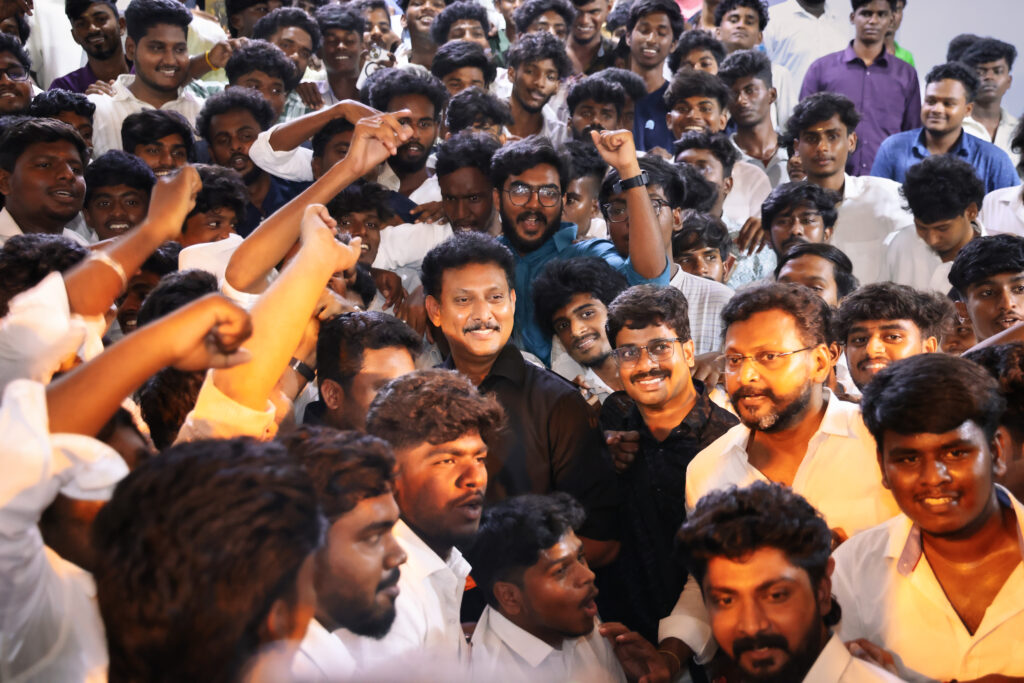
On the evening of June 29, 2025, Periyar Thidal in Chennai was overflowing with student enthusiasm. The public and digital editions of the book “National Education Policy 2020: The Rogue Elephant”, written by Minister Anbil Mahesh Poyyamozhi, were launched under the leadership of Dravidar Kazhagam President and respected scholar K. Veeramani. The event, jointly organised by the Dravidar Kazhagam Student Wing and DMK Student Wing, featured a special address by the Tamil Nadu School Education Minister.
He began with these powerful words: “Today, we're gathered in the headquarters of our mother organisation, Dravidar Kazhagam. This venue bears the name of the revolutionary actor M. R. Radha. I have come to where I belong. As our teacher Ayya often says, ‘Anbil Dharmalingam was Periyar’s dearest son.’ My grandfather, Anbil Dharmalingam, once brought M. R. Radha on a bullock cart to a huge public meeting in our small village of Anbil. This event feels like the culmination of all those memories.”
I’ve arrived at the place I was meant to be
Our teacher, Ayya, often says with affection, “Anbil Dharmalingam was Periyar’s beloved son.” My grandfather, Anbil Dharmalingam, once brought the revolutionary actor M. R. Radha on a bullock cart to the small village of Anbil—and held a massive public meeting there. Stories like these have been passed down to us over the years. And today, it feels as though all those stories, all those moments, have come together—because we now stand exactly where we were always meant to be.
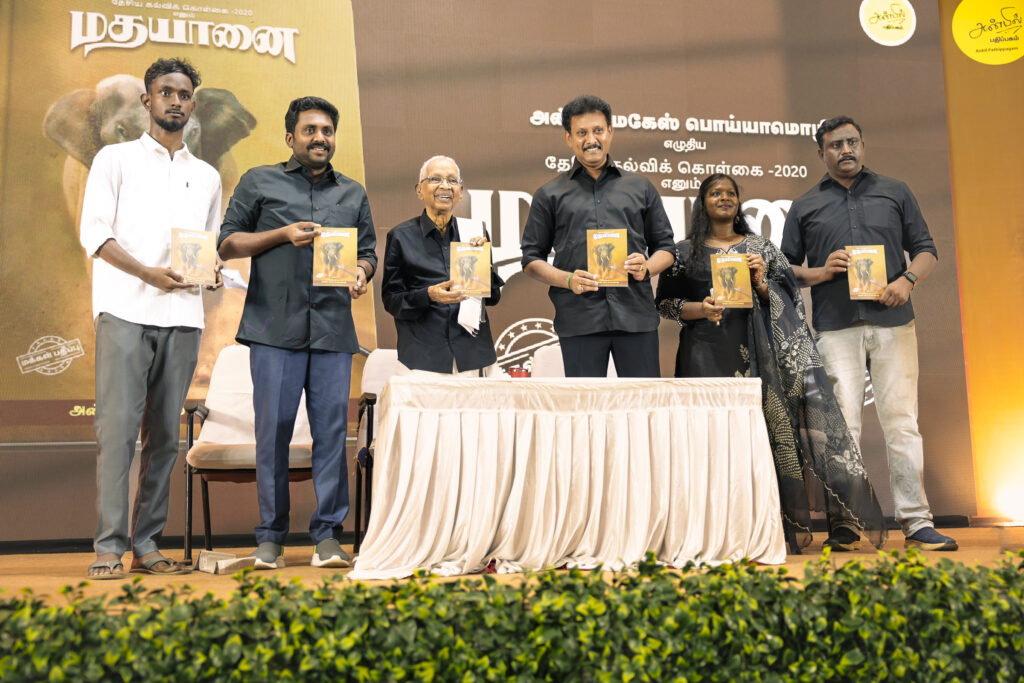
To all the youth, students, party organisers, and respected elders gathered here— I urge you to reflect deeply on why an event like this is being held in this very place. Ask yourselves: Why did we feel the need to write such a book? That question deserves to be asked and answered right here, today.
We must not divide human beings.
To put it simply: just as we identify the head, shoulder, thigh, and leg as parts of the body, we should never turn these into symbols to divide people. That fundamental idea is what led to the creation of this book—National Education Policy 2020: The Rogue Elephant.
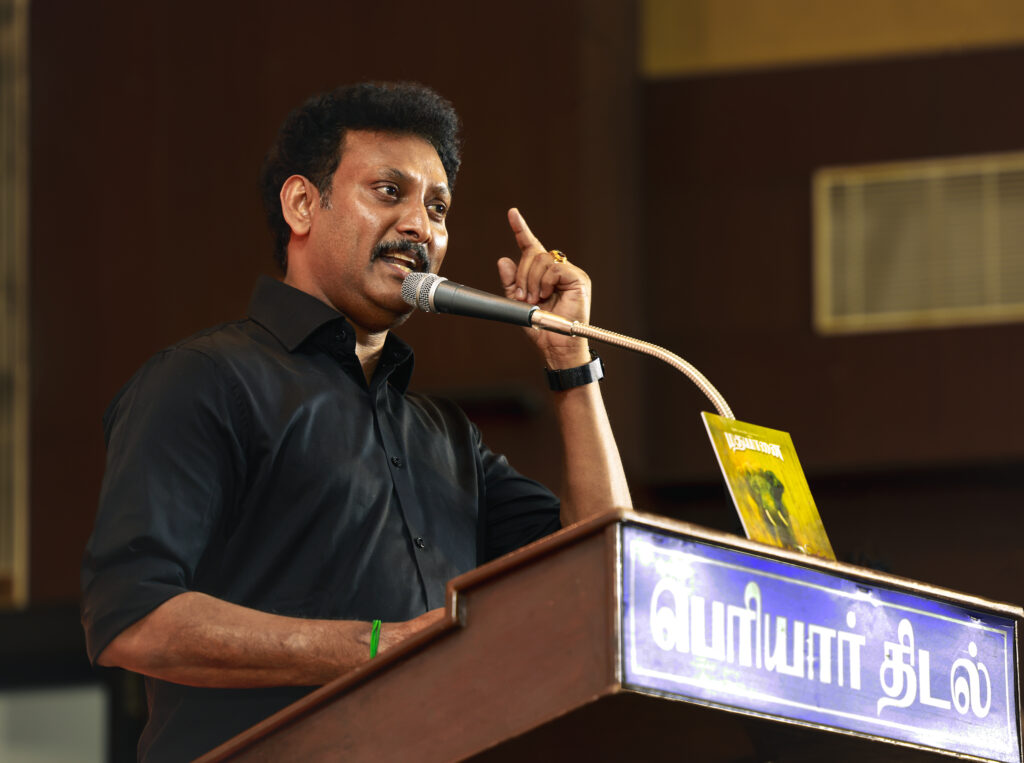
Today’s youth can broadly be grouped in two ways: Those who love to engage deeply with ideas and read extensively. Those who absorb ideas through lived experiences and emotional resonance. Both are equally meaningful. The messages we want to convey must be shared with historical evidence. Young people are drawn to new formats—they observe, they listen.
If a young person performs a rap song, it strikes a chord with other youth. A socially conscious and progressive generation is taking shape. And it is for this new generation that events like these are being organised.
A Chief Minister Who Gave Me Courage!
At the launch of “NEP 2020: The Rogue Elephant”, our Hon’ble Chief Minister said, “In today’s political climate, writing a book like this itself requires courage.” It was he—my political mentor and guide—who gave me that courage.
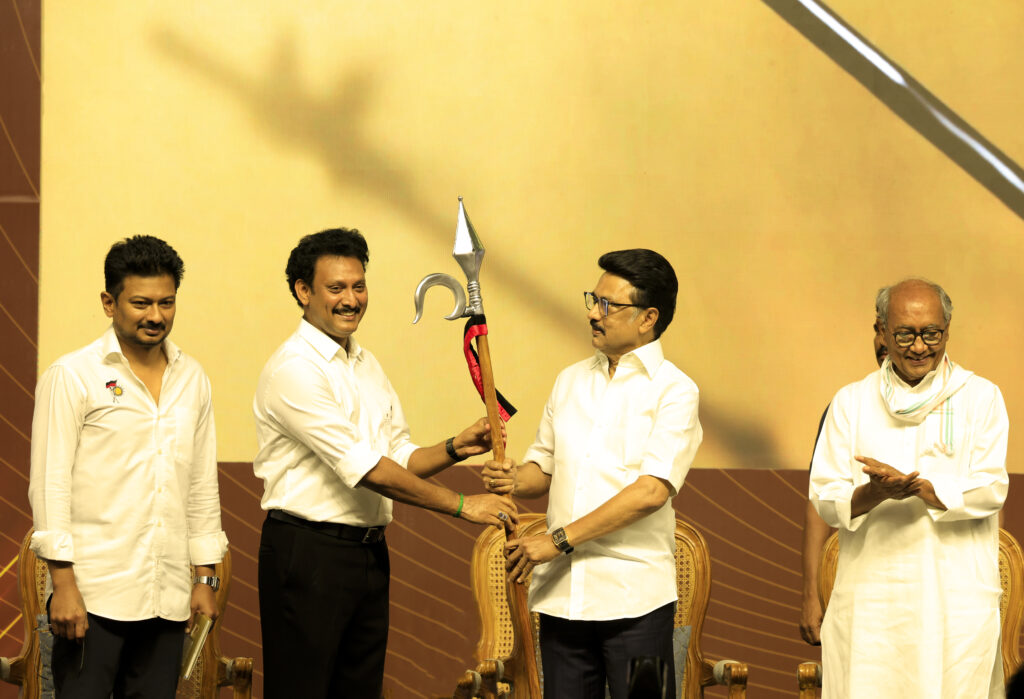
And today, this book is being talked about in many circles. Its ideas are sparking debates and conversations across the state.
“Who’s that boy?”
“I’m that boy!”
There will be people in the Union who ask,
“Who’s that boy who dared to write a book titled The Mad Elephant?”
And to that question, every young person here must rise and say with confidence,
“I’m that boy!”
Though this book bears my name, it truly belongs to you. It is your book. It defends your right to education. It was written as a stand against the denial of educational rights to your fellow students in schools and colleges.
So when someone asks, “Who wrote this book?”,
stand tall and say,
“I’m that boy!”
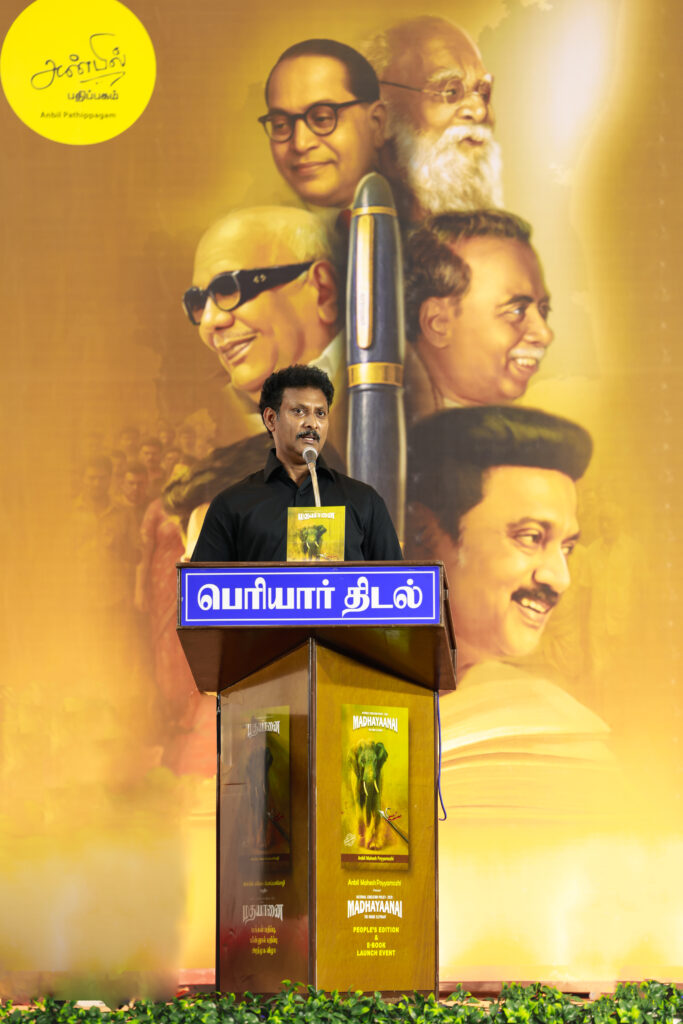
A Lifelong Honour—A Rare Blessing
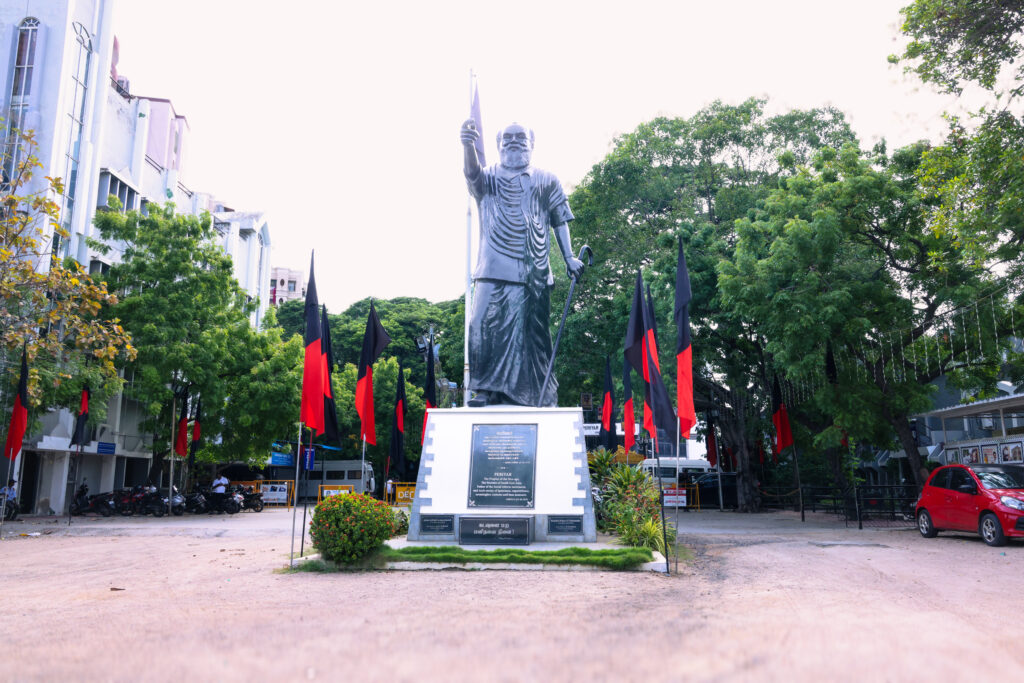
I’ve come to Periyar Thidal—the beacon of rationalism—many times, for many events. I’ve sat in the audience watching our Hon’ble Deputy Chief Minister release books. I’ve attended weddings and other gatherings in this very hall. But today is different. Today, I stand here for the launch of Madhayaanai. I’ve come not just as a participant, but as someone presenting my own work, in our headquarters, in the presence of our revered Ayya, to hear his words. To me, this moment is not just an honour—it’s a blessing I will carry for the rest of my life.
May You Live Beyond 100, Ayya!
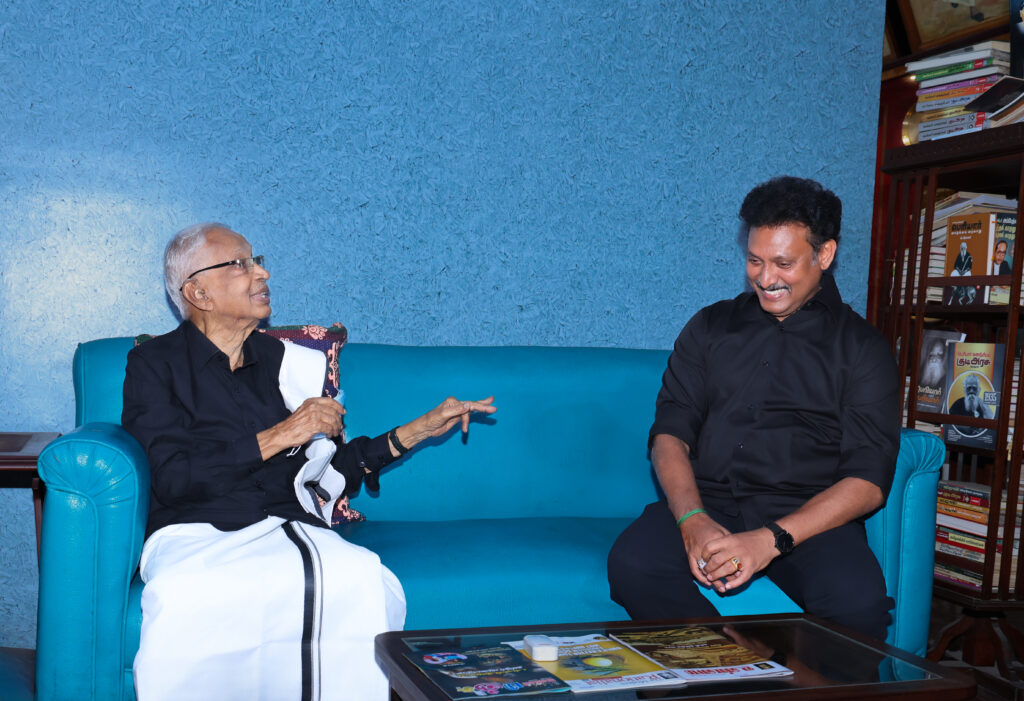
As we mark the centenary of the Self-Respect Movement, the very fact that we still need to write books like this says a lot about the times we live in. But thankfully, we have our teacher—our Ayya—to guide us. “Ayya, not just 92—may you live beyond 100 and continue to spread these ideas.” We say this not just as a blessing but as a request. Because we know you won’t stay still. We’re constantly watching you—through Viduthalai, through social media, and through the countless speeches you deliver, day after day, in town after town. We don’t know where your energy comes from. But every time we see you, we’re reminded—we too must keep working, keep striving, keep speaking up for our society. The Self-Respect Movement gave us leaders like Arignar Anna and Muthamizh Arignar Kalaignar. Today, Ayya, you carry that legacy forward—and we’re walking behind you.
Puravalar Anbil Dharmalingam
Whether it was the South Indian Welfare Rights Association, the Self-Respect Movement, the Justice Party, the Dravidar Kazhagam, or the DMK—Ayya Puravalar Anbil Dharmalingam played a vital role in every one of these movements. As his grandson, and as someone carrying that legacy forward, I say with pride and responsibility: writing this book and standing on this stage today is part of that duty. To the youth gathered here, there is one truth you must clearly understand— You must recognise how the BJP-led Union government is continuing to betray us. See it, question it, and resist it with clarity.
5,000 Years Ago, It Was the Tamil Who Used Iron First!
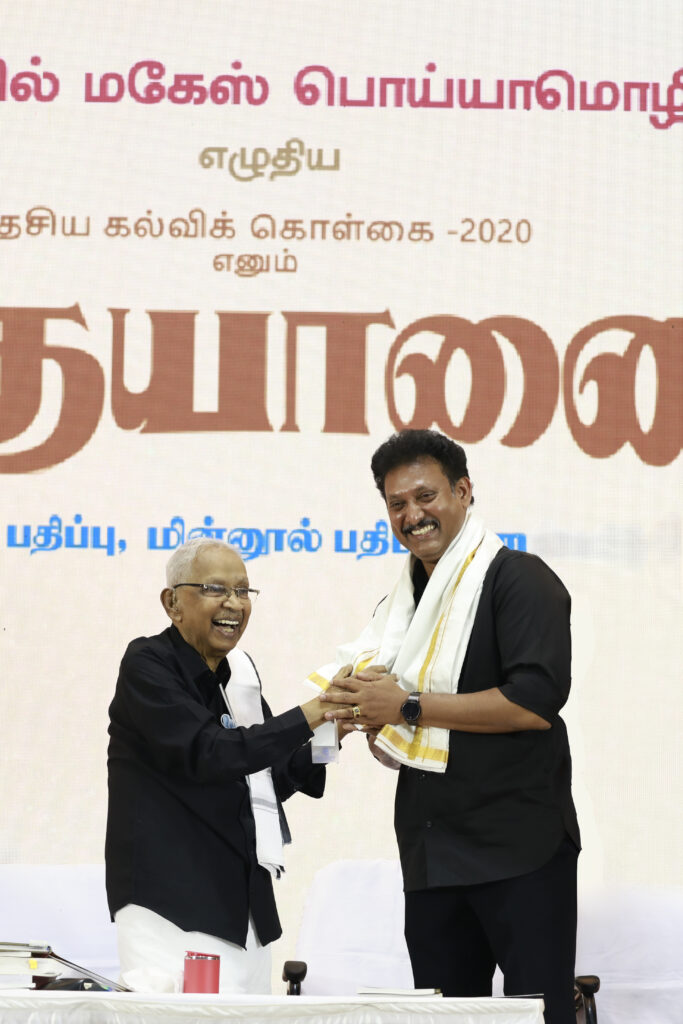
We are the speakers of one of the world’s most ancient languages. The Tamil people are a distinct and proud civilisation. And we don’t just claim antiquity—we have scientific proof. Recent discoveries confirm that it was the Tamil who used iron as far back as 5,000 years ago. That’s a legacy we must never forget. Tamil is for identity. English is for opportunity. We understand this clearly. But today, the BJP-led Union government is actively working to erase that identity. Please reflect on what they’re doing—and where it begins. It begins with things like the NEP (National Education Policy). Quietly, step by step, they dull our knowledge and condition us to repeat their views, until we begin to think their truth is the truth. That’s why we must stay alert. That’s why this conversation matters.
We Are Poking Our Own Eyes With Our Own Fingers
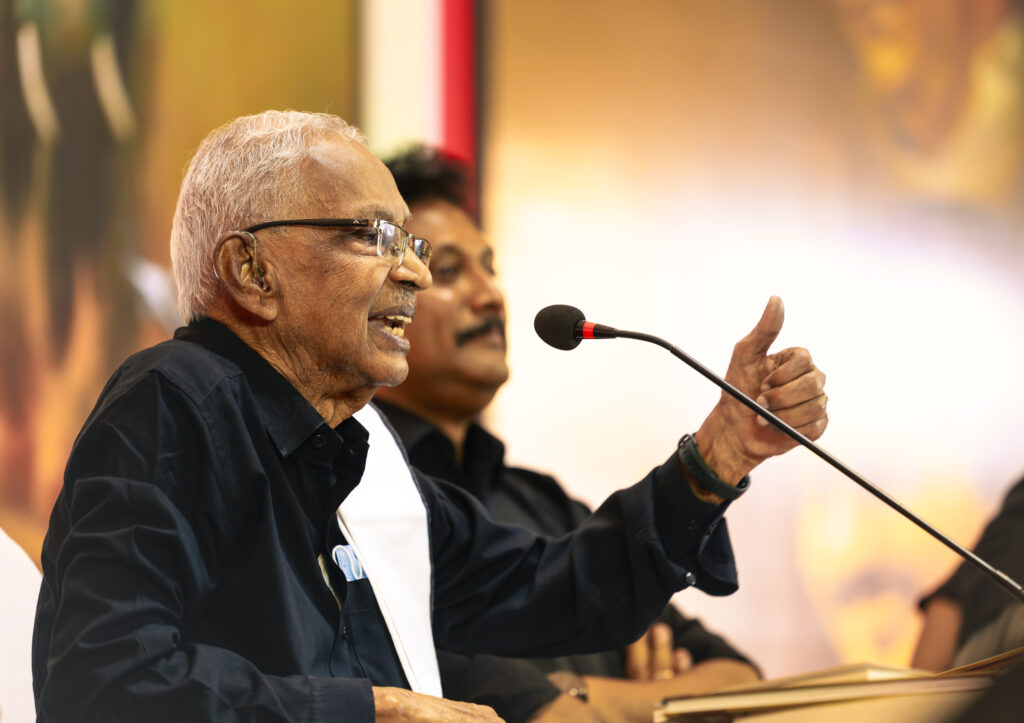
That’s exactly what NEP 2020 is making us do—poke out our own eyes with our own fingers. And that’s why we felt the need to expose it. Tamil civilisation had thriving literary and knowledge traditions up until the 3rd century CE—our Sangam academies stood as proof. But after that, those institutions were slowly dismantled. Gradually, our access to knowledge was shut down. Our educational heritage was buried. We must understand that NEP 2020 is not just a policy—it’s part of a long, calculated effort to suppress our intellect and erase our identity.
It Took the Justice Party, the Dravidar Kazhagam, and Periyar to Reclaim Our Knowledge
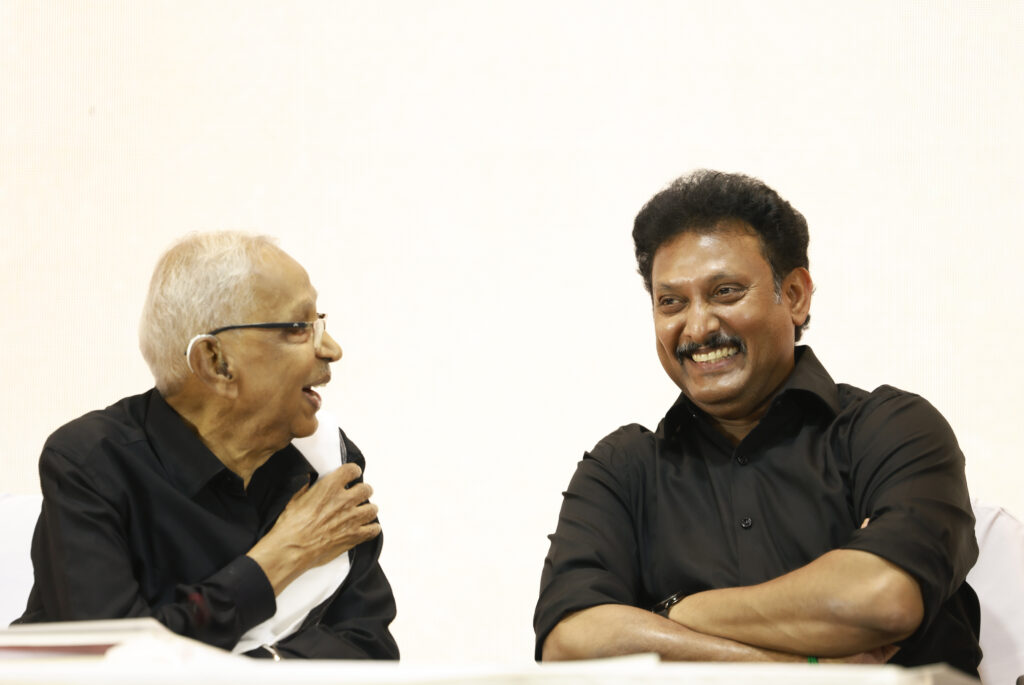
For nearly 17 centuries, our access to knowledge was shut off. To reopen that door, we needed the Justice Party, the Dravidar Kazhagam, and above all, Thanthai Periyar. Without them—without the birth of this movement—we wouldn’t be sitting together in this hall today, as equals. Periyar believed that true clarity—true liberation—can only come through knowledge. That’s why he spoke about education not just in terms of science, but also in terms of dignity and morality. “Whatever teaches us self-respect, scientific reasoning, and ethics—that alone is real education. Anything that fails to do so cannot be called knowledge.” That was Periyar’s clear, unwavering stand.
It Took 17 Centuries for Us to Regain Access to Education
Seventeen long centuries passed before we reclaimed the right to education. And even then, was it handed to us easily? No. Just when the doors opened and our children were finally able to attend school, came the imposition of Hindi. Then came a time when you could only become a doctor if you knew Sanskrit. Then came the caste-based education scheme. Through all of it, Thanthai Periyar stood firm, striking down each injustice with the walking stick in his hand. Had he not done that, we would not have the access to knowledge we have today. As early as 1938, Periyar clearly said: “Separate religion from knowledge. If you use religion to block learning, there will be no true enlightenment.”
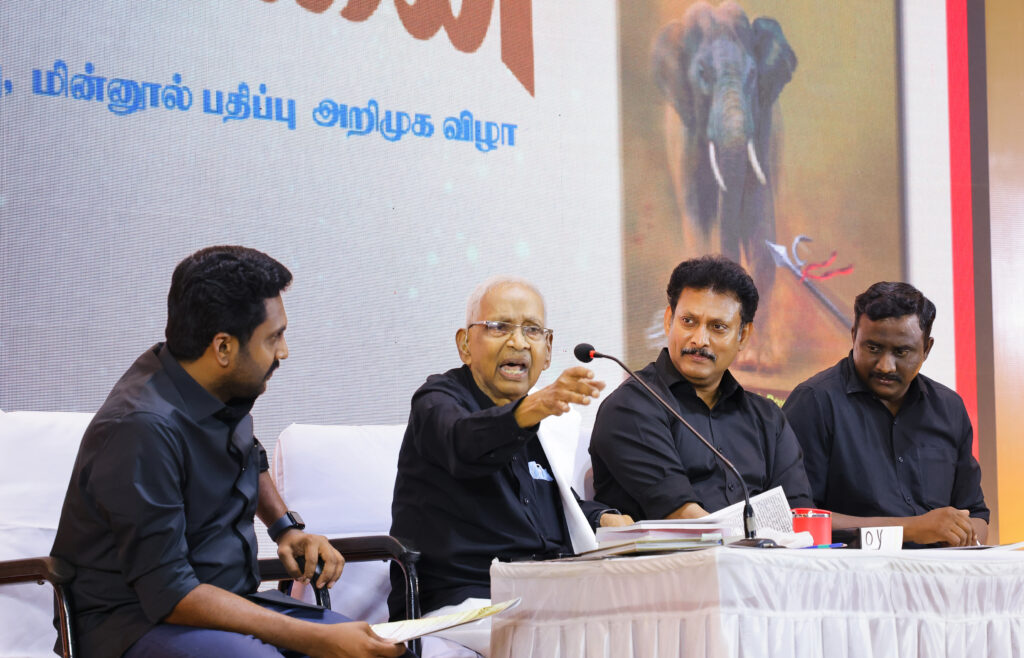
A society that clings to religion falls into ruin. A society that embraces knowledge and scientific thinking moves forward. Books like this are written to provoke that very spirit of progress.
Artificial Intelligence & Robotics
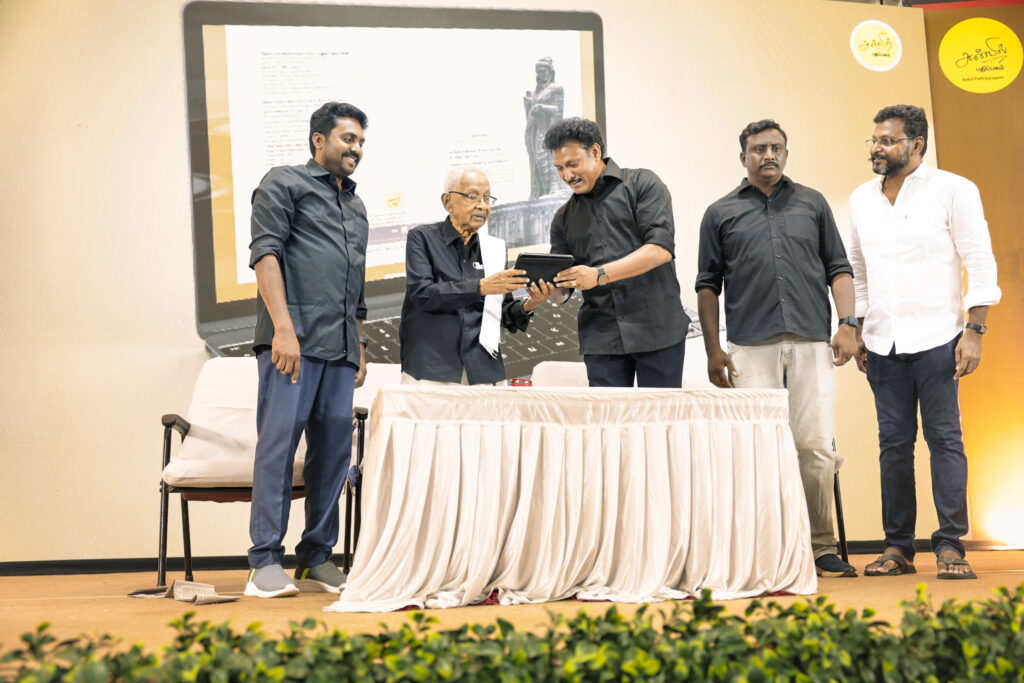
The National Council of Educational Research and Training (NCERT) is busy exploring how to weave in ideas from the Ramayana, Mahabharata, and Vedic philosophy into school syllabi. But in Tamil Nadu, we are teaching our students Artificial Intelligence and Robotics. For us, education must be rooted in science and technology. That’s our path. And that’s something they cannot accept. We believe our children must compete—not just with other Indian states—but with the world. We’re updating our curriculum with future-facing technologies to take our students to the next level. Because we’re not preparing them for the past. We’re preparing them for the future.
Who Framed the National Education Policy 2020? உருவாக்கியது யார்?
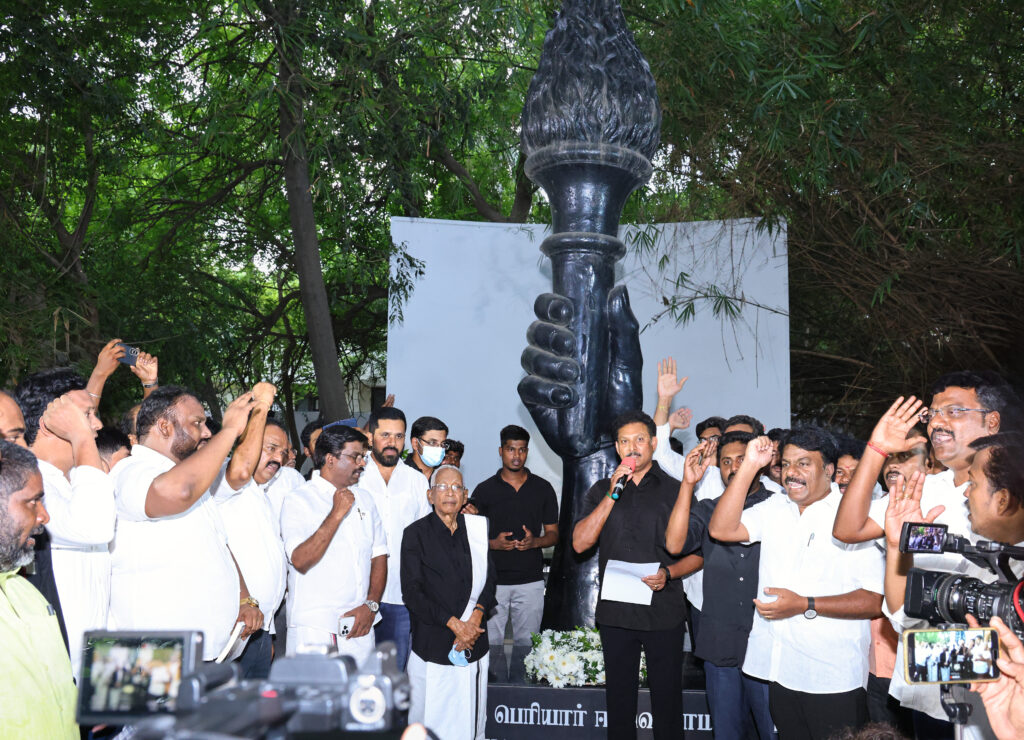
Who exactly created the NEP 2020 that the BJP-led Union government brought in? It wasn’t educationists or scholars—it was the RSS, an organisation rooted in religious majoritarianism, along with 11 of its affiliated bodies. Together, they crafted this regressive policy. How can we accept such a product? This book was written to expose that very truth. We speak often of the Dravidian movement and the Dravidian Model of governance. Every minister in this model works with commitment—not just to their department, but to the movement’s vision, values, and purpose. It is this ideological clarity that drives us to write books like The Mad Elephant. We don’t compromise on our principles—and we never will.
We Must Compete with the World—Not Just Other States
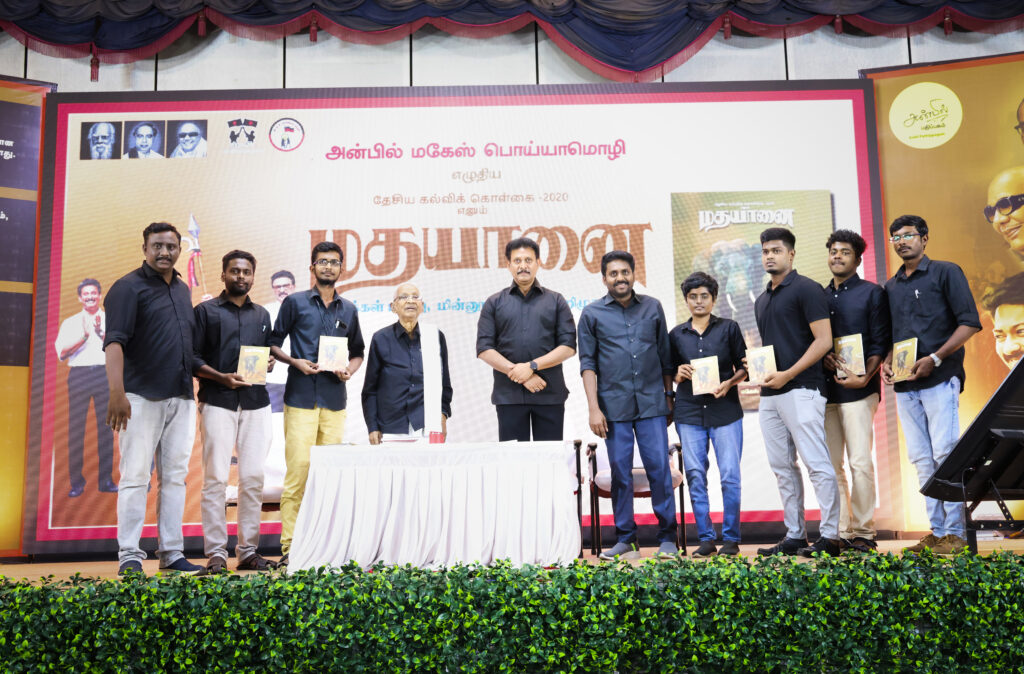
We walk the path laid down by Thanthai Periyar, Arignar Anna, and Muthamizh Arignar Kalaignar. That’s why our Chief Minister boldly says: “If you're telling me you'll give Tamil Nadu its rightful ₹2,152 crore only if we accept your policy—then even if you offer ₹10,000 crore, we don't need it. We will manage on our own.” That conviction comes from clarity. This is why we write books like The Rogue Elephant—loud and clear. This is why we raise difficult questions. And yet, instead of reflecting or correcting course, the Union government continues to impose its agenda without pause. But Tamil Nadu will never bend. Because we’re not competing with other Indian states—we're preparing to compete with the world.
It Is You—the Youth—Who Must Speak Up
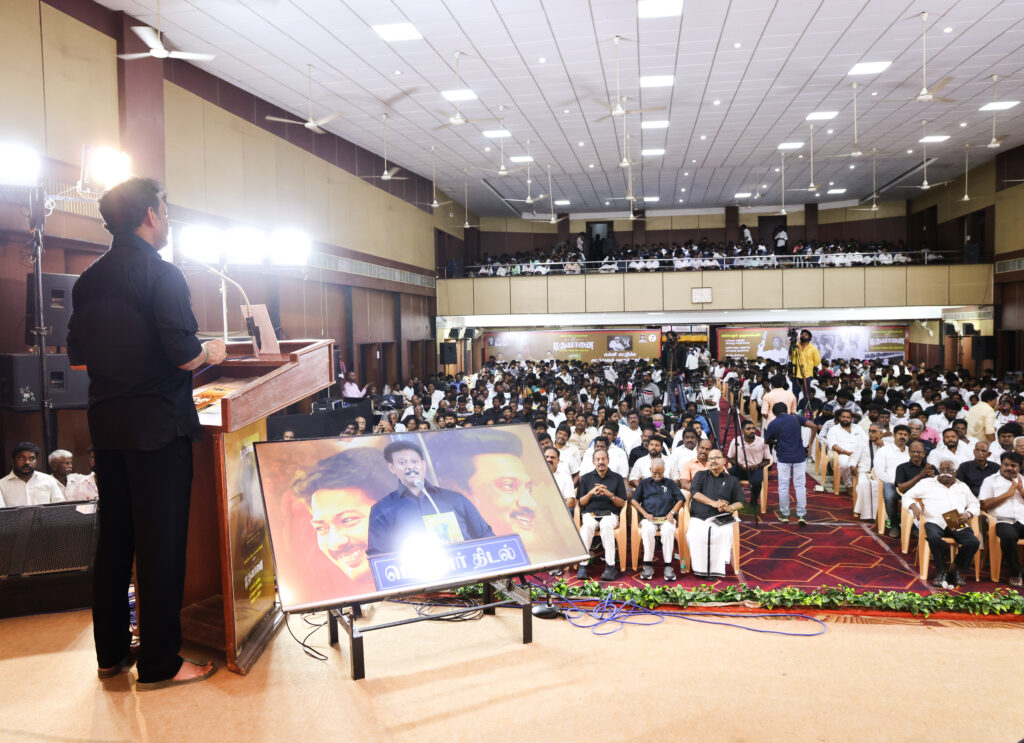
Do you know who bears the greatest responsibility to speak out against this imposition? Not just those of us on this stage. It rests with you—the younger generation sitting before us. This student gathering must become a collective that understands and absorbs these ideas. That’s exactly why we organised this event—with the support of our dear comrades—so that this message reaches the youth who will shape tomorrow.
The Edits Suggested by Our Teacher
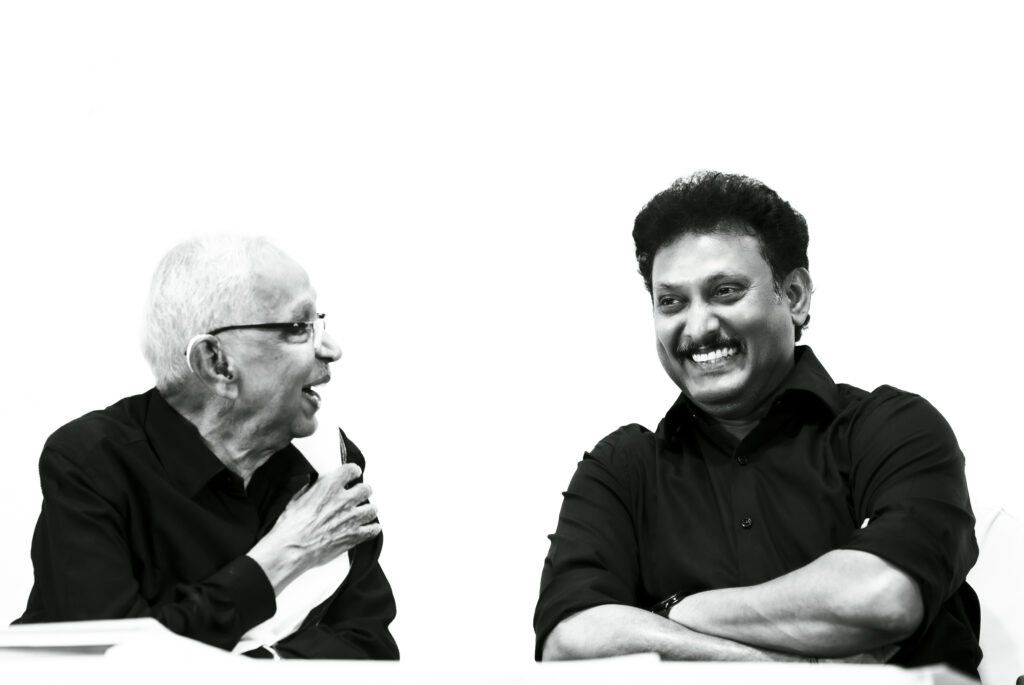
Ayya, our teacher, pointed out a few minor corrections in the Rogue Elephant book. And that’s exactly why we all respectfully call him Asiriyar—the Teacher. I made sure to incorporate every suggestion he gave. Today, like a student before his master, I handed him a fresh, revised copy and said, “Ayya, I’ve made the corrections you recommended.”
Red underlines and green highlights—everywhere!
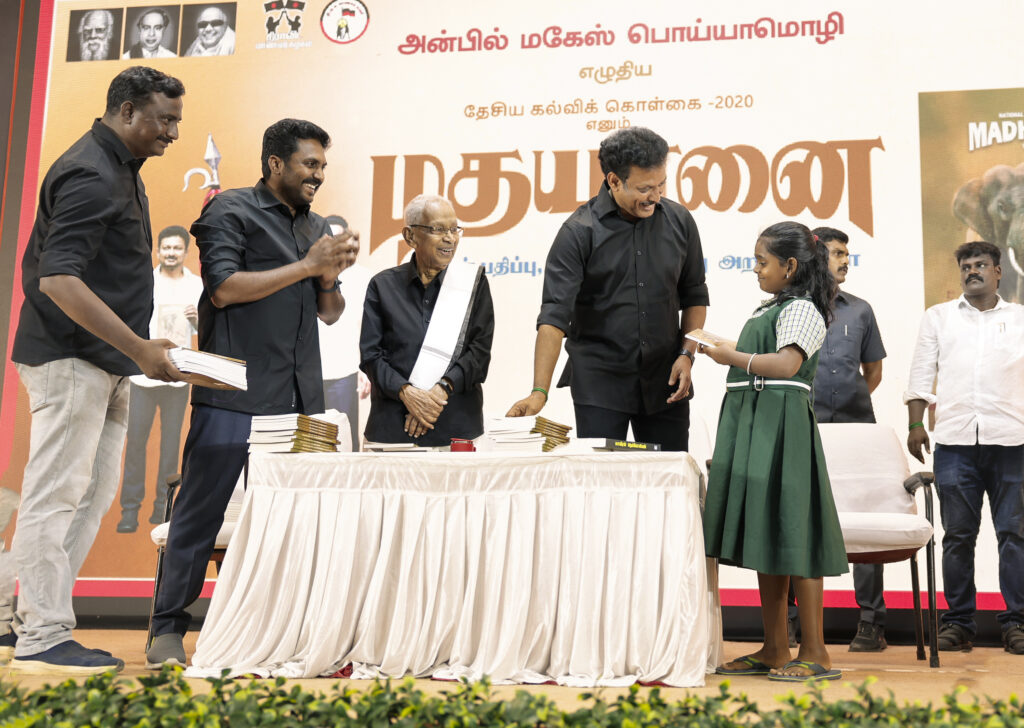
The moment Ayya, our teacher, saw me today, he said, “I read the book you gave me right away. Wherever I looked, there were only red underlines and green highlights!” But those red marks weren’t just editorial suggestions. When I saw those red lines, I saw the sacrifices of those who gave their lives for our language. And the green highlights? They weren’t just notes—they were reminders of our collective emotions, our dignity, our identity. To all the young comrades gathered here, I urge you—read this book at least once. We didn’t write it to make a political statement. We’re not blindly opposing every policy the Union government brings in. This book is rooted purely in school education. It doesn’t even touch college-level issues. It's a call for awareness, not a cry of politics.
We’re repeating what Periyar once said.
As the Minister for School Education, I’ve been careful not to overstep my role—so I’ve focused only on issues related to school education in raising this awareness. But let me be clear: through nearly 39 different provisions, unnecessary impositions are being brought upon us. It is our students who are affected. It is our parents who are affected. It is our respected teachers who are affected. And if you believe that what we’re saying is incorrect, you are absolutely free to question us.
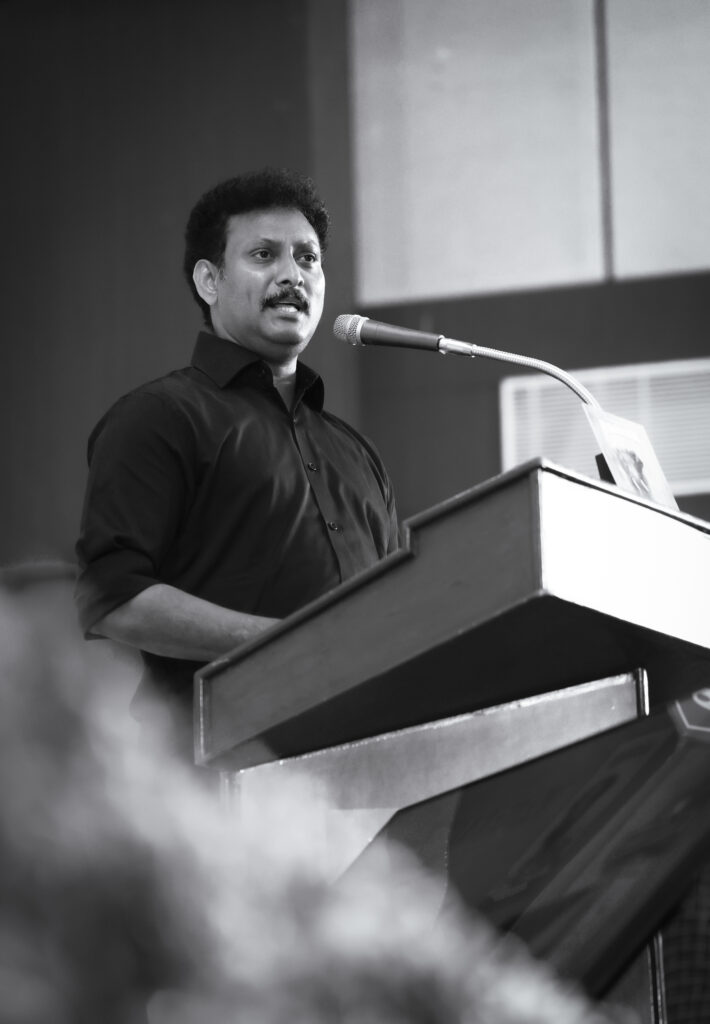
We say now what Periyar once said: “There’s no need to blindly believe what we say. You have your own reasoning, don’t you? Use that. If your conscience tells you, ‘Yes, what Anbil Mahesh is saying is right,’ then accept it.” This book is 240 pages long. You can read it in two hours. And in those two hours, you’ll clearly see how we’ve been deceived, how we've been betrayed.
Chief Minister Is Our Shield
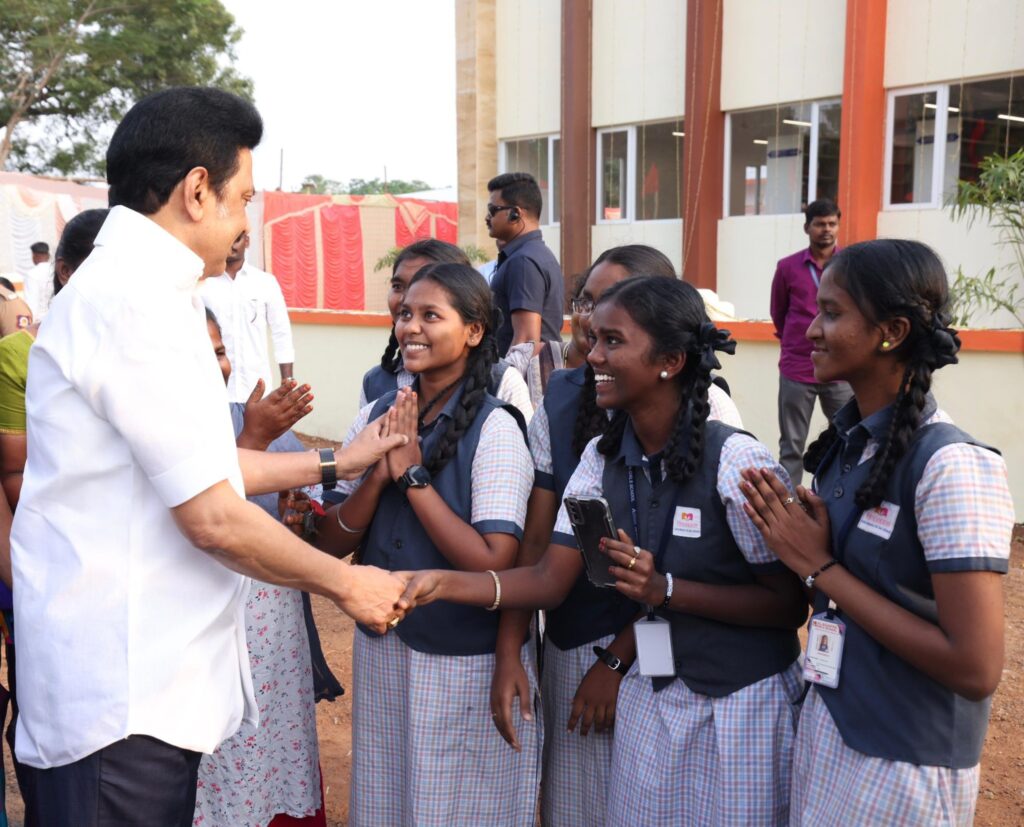
Our Chief Minister stands as a fortress, protecting both Tamil Nadu and our school education system. When we say there must be no room for regression in any form, our guiding light—our satellite—is right here at Periyar Thidal. This space watches over us, and in response, we keep evolving. We keep correcting ourselves. That’s exactly why we are here today, participating in an event like this.
A Grateful Closing
“Thanks to all the students, young people, movement leaders, and especially our Tamil leader, Ayya, who turned this evening into a powerful and purposeful moment.” He concluded with high emotion and pride. The address sparked enthusiasm and resolve among the DMK and DK student wings.
Before the book launch, Minister Anbil Mahesh raised the five ideological slogans of the DMK—first introduced by Kalaignar Karunanidhi—at the Periyar memorial, joined by student wing members in an inspiring pledge.
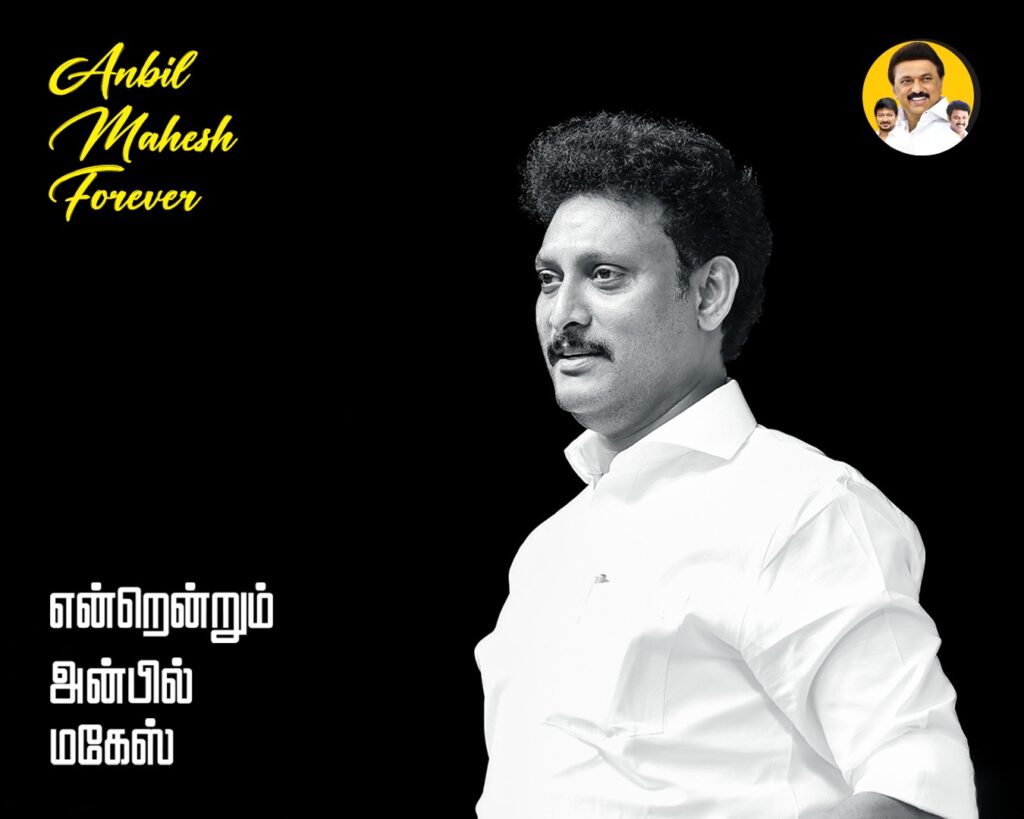
Follow us
Whatsapp Channel – bit.ly/anbilmahesh4evr
X ID – https://x.com/AnbilMahesh4evr
Youtube – https://youtube.com/@AnbilMahesh4evr
Facebook – https://fb.com/AnbilMahesh4evr
Instagram – https://instagram.com/AnbilMahesh4evr
